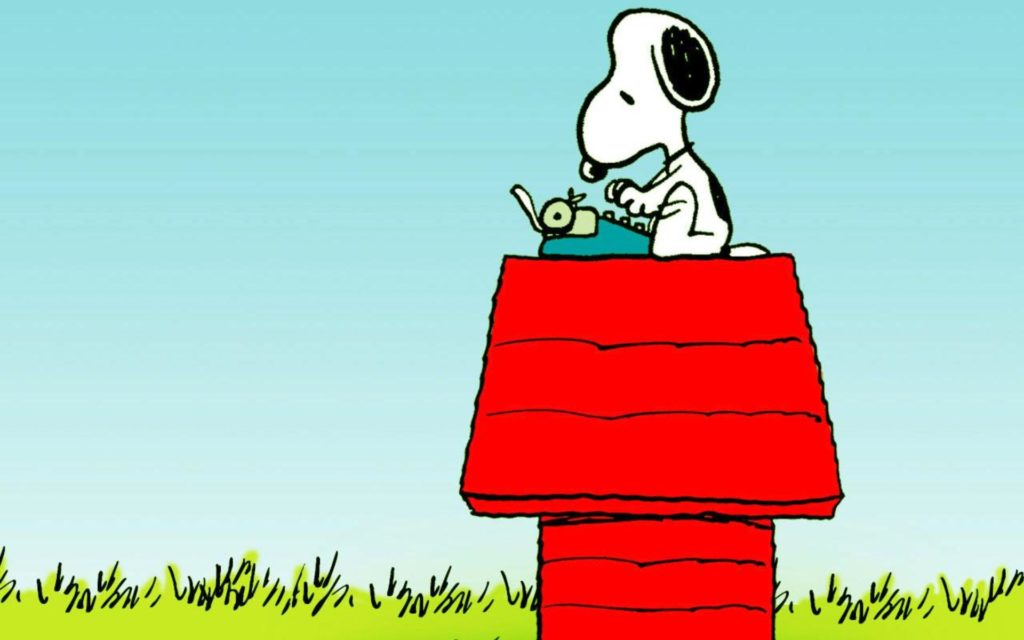In this guest post, Samia Djilli arms us with the tools we need when faced with friends and relatives questioning your creative degree (or even job!). Good luck everyone!
Hopefully over Bank Holiday weekend, you got the chance to get together family and friends. Some maybe you’d not seen in a while, which is why you can forgive them when they ask a million questions, wanting to know every little thing about you – including the whole purpose of your degree and what exactly you plan to do with it…
This can lead to some quite silly questions, and in all honesty, we ALL tend to ask stupid questions (pity the doctor in the family who spends their holiday meal hearing about people’s ingrown toenails, or the person whose job is dubbed ‘boring’ and gets ignored entirely).

That said, writers do tend to encounter some pretty outrageous misconceptions, especially when it comes to studying creative writing – here’s the ones I’ve come across and how I’ve dealt with them, without making it so that Aunt Sarah refuses to speak to me at the next family meal.
1- “It’s just writing about sunshine and flowers then?”
I remember when I started my degree, about twenty people must have asked me if I loved writing about sunshine and flowers. And coupled that with a pandering look and sarcastic tone.

Perhaps this is a female-oriented thing as my male peers would only ever get asked if they wanted to write science-fiction or War stories, but the questionmakes no sense.
Sure, if you felt so inclined, you could write about sunshine and flowers while studying a Creative Writing degree, but I’m afraid that’s not all you’re going to have to do.
Like any degree, you’ll have a million things to do at once, and they won’t simply consist of writing stories about pretty things. Depending on what you choose to focus on, you’re time will most likely be spent on theory and how to perfect your narrative form.
Even if you do choose to write about sunshine and flowers, you’ll spend a vast amount of time on a 3,000 word critical commentary detailing the cultural, social and literary concepts behind your writing.
My response? Well if Aunt Sarah really wants, I’m happy to read out my critical commentary at the dinner table…. What was that? No? You’re not too bothered anymore?
2. “So, you just…write stories all day?”
Picture me sitting at the dinner tale, having just explained about the critical commentary, and then I get asked this (*insert eye roll here*).
A Creative Writing degree does exactly what it says on the tin: it teaches you how to write creatively. This consists of journalism, playwriting, screenwriting, copywriting, non-fiction, poetry and more.
You’re pushed to write in every way possible, and to perfect that writing at a professional level. It’s also important to note that for every piece of creative work you have to submit, an accompanying theoretical essay is mandatory!
But, I can’t fault the relatives on this one – we do, of course, also write stories, so I’m happy just to nod politely at this question! And, instead, I’ll just save my breathe for what’s coming next…
3. “You don’t actually do anything…”
One of the greatest myths that comes along with any creative degree is that it’s a degree for those who don’t really want to do any work. In my opinion it’s the opposite way round.
It sounds all a bit cheesy but you’ll actually find the most dedicated people studying a creative degree as everyone there is trying to perfect what they’re creating. I know, it can sound very pretentious, but really, people aren’t sitting around all day, wearing berets, drinking overpriced coffee, and discussing Brecht.
Instead, they’re working on original ideas and using their degree as a way to deliver those ideas in the best way possible. If I had wanted to do a Creative Writing degree because you think it’s easy, I’d have been better off buying a beret and a pumpkin spice latte. (Hold on a second… is that why everyone always buys me berets for Christmas??)
Regardless, I believe a proactive defence is best with this one: wear as many berets as possible and if time, grow out a moustache to really fit that ‘hipster artist’ image.
4. “Do you even learn anything?”
This is of a similar vein, but often people, no matter how much work you tell them you’re doing, seem to think that you don’t actually learn anything on a Creative Writing degree.
Of course this is dependent on where you study and how many independent work hours you put in, but if those things are all well and good, you’ll come out of it with a breadth of knowledge that you didn’t previously have.
Before I started my degree I didn’t know what a screenplay was or how you structured one but, at the end of it, I felt confident enough to send my work to industry professionals.
I also now have faith that even if they don’t like my ideas, they will be able to tell from my writing that I know what I’m doing.
Of course, if you already know how to structure a screenplay, write a novel, and put together a decent piece of editorial, then maybe my relatives are right, a Creative Writing degree isn’t the route to go down.
It’s definitely not a one-size-fits-all option but, for me, doing a Creative Writing degree was the best thing to do, and ironically I think my relatives would actually find it really fascinating too!
Maybe I should’ve asked my lecturer for a ‘Bring Your Parents to Uni’ day…
5. “You’ll never find a job!”

So hands up who’s got this one before? And I’d be lying if I said this wasn’t a fear I also had before starting my course. It’s also something that echoed throughout the entirety of my degree. The main worry is that no matter how many skills you gain, none of them will equip you to get a job that can pay the bills.
Depending on how much like Scrooge you’re feeling, you can point out that this doesn’t really differ from degree to degree, and there are plenty of people who study Maths, Science, Law (essentially what you’re relatives wanted you to study), and are in the same predicament of not finding a job post-graduating.
There are also so many extraneous variables that come into play here like social-class, disposable income, health, location and more. In my opinion, if you put yourself out there, you’ll find something – it just (like anything) takes a healthy amount of persistence.
So it’s probably best just to tell your family that you’re working hard and you’ll find something you love soon enough (even if you have to say it through gritted teeth…).
6. “Do you think you’ll become an overnight success then?”
It’s actually pretty lovely relatives think I could become the next J.K Rowling, but even the people that seem like an overnight success, have actually spent years working on their stories and scripts before they see the light.
And J.K Rowling is a perfect example of this and is definitely someone to bring up if/when you get asked this.
Of course, I am in no way saying that you can’t become an overnight success and it’s better to go into your degree as you would go into anything: with hope. But hard work is what will pay off in the end (if you can stomach the cliche!)
One thing you’ll find out in a Creative Writing degree is what part of the industry your writing connects with most strongly. When I started my degree, I was convinced I wanted to write novels, yet I came out of it realising that playwriting and screenwriting are my strong points.
Once you’ve realised what you should focus your attention on, you’ll start to figure out an action-plan that can lead you to be satisfied within your creative career. You may not necessarily be an overnight success, but you’ll have the skills and the mind-set to get you where you need to go, and that’s the most important thing.
In fact, it’s much more important than any blank stares or patronising questions you’ll have to face at your next family reunion. Yes, I want to be a playwright, and yes, I chose to study Creative Writing.
Just like any other degree, a lot of time, effort and money goes into it. And, as much as we chastise our relatives for asking the wrong questions, at least we get asked about J.K Rowling rather than ingrown toenails, so maybe us writers don’t have it so bad after all!





I wish I had actually planned ahead before embarking on my creative writing degree. I would advise anyone doing one in the future to do an internship every summer (even a fourth as a placement) in publishing, advertising or even shadow a English lecturer at Uni – Experience and exposure counts. Opportunities are hidden. Also, work on a portfolio, enter writing competitions, freelance while at uni when you don’t have to worry about bills. Good luck.
I would do what I do. Smile.